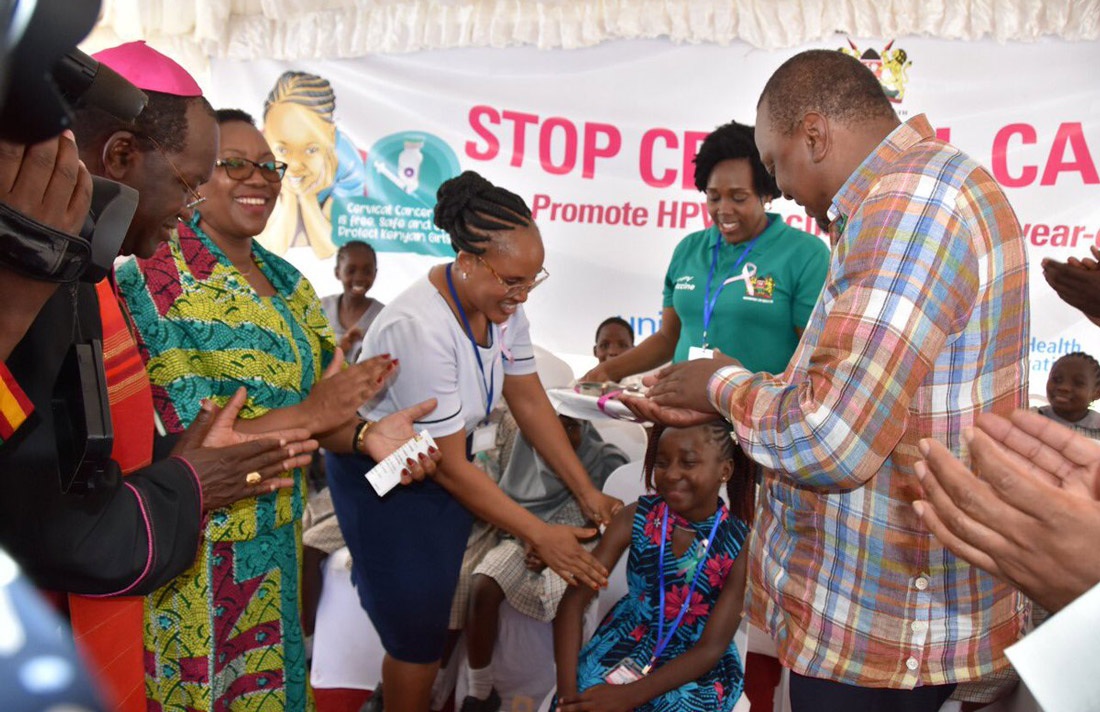Mombasa, 18 October 2019 – Around 800,000 girls across Kenya will be protected against cervical cancer annually following the introduction of human papillomavirus (HPV) vaccine into the country’s routine immunisation programme, Kenya’s Cabinet Secretary for Health Sicily Karuiki announced today at a launch ceremony in Mombasa County.
“Scaling up access to quality health services, particularly for women and girls, is a critical part of Kenya’s Big Four Action Plan,” said Sicily Karuiki. “Cervical cancer is the leading cause of female cancer deaths in Kenya. Working with partners like Gavi, UNICEF and WHO to introduce HPV vaccine into our routine immunisation programme is an important step forward in ensuring the health and long-term prosperity of the Kenyan people.”
The vaccines, provided through support from Gavi, the Vaccine Alliance, will aim to reach all girls aged 10 in two doses administered six months apart.
''Today we celebrate Kenya’s commitment to protecting its girls and safeguarding their futures,” said Dr Seth Berkley, CEO of Gavi, the Vaccine Alliance. “Mothers, grandmothers, daughters, wives – too many women’s lives in the poorest countries are cut short by the scourge of cervical cancer, and the greatest tragedy is that the vast majority of cases are entirely preventable via routine immunisation with HPV vaccine.”
The East African region has the highest burden of cervical cancer in the world. In Kenya, where HPV is the number one cause of cancer in women between the ages of 15 and 44, approximately 5,250 new cases are diagnosed annually.
“Cancer not only affects the patient. One person affected by any form of cancer affects the whole community, a constituency and the entire nation. Therefore introduction of any additional effective, safe and scientifically sound tool that protects people from cancer is a good decision.” said Dr Rudi Eggers, WHO Country Representative for Kenya.
HPV is highly transmissible and infection is very common. Of the more than 100 types of HPV, at least 14 are cancer-causing, and two (types 16 and 18) are responsible for 70% of cervical cancer cases. In developing countries like Kenya, where women often lack access to cancer screening and treatment services, immunising girls before exposure to HPV is critical. Safe and effective HPV vaccines can prevent up to 90% of all cervical cancer cases.
Effective implementation and introduction of new vaccines into routine immunisation programmes requires collaboration to raise awareness and generate demand. “Nearly all cases of cervical cancer can be prevented through vaccination, potentially saving around 3,000 women’s lives in Kenya every year,” UNICEF Kenya Representative Maniza Zaman said. “In order to achieve this, we need to dispel myths and misconceptions that could negatively impact vaccine uptake. UNICEF is supporting the Government to provide clear and evidence-based information to people about the benefits, safety and efficacy of HPV vaccine.”
To date, Gavi has supported the immunization of 3.9 million girls against HPV worldwide and helped 14 countries introduce HPV vaccines nationally – Rwanda, Honduras, Uganda, Bolivia, Sri Lanka, Guyana, Tanzania, Zimbabwe, Ethiopia, Senegal, Malawi, Solomon Islands, Zambia, and Kenya. The Alliance aims to reach more than 13 million girls with HPV vaccine by the end of 2020.
Notes to editors
About Gavi, the Vaccine Alliance
Gavi, the Vaccine Alliance is a public-private partnership that helps vaccinate half the world’s children against some of the world’s deadliest diseases. Since its inception in 2000, Gavi has helped to immunise a whole generation – over 760 million children – and prevented more than 13 million deaths, helping to halve child mortality in 73 developing countries. Gavi also plays a key role in improving global health security by supporting health systems as well as funding global stockpiles for Ebola, cholera, meningitis and yellow fever vaccines. After two decades of progress, Gavi is now focused on protecting the next generation and reaching the unvaccinated children still being left behind, employing innovative finance and the latest technology – from drones to biometrics – to save millions more lives, prevent outbreaks before they can spread and help countries on the road to self-sufficiency. Learn more at www.gavi.org and connect with us on Facebook and Twitter.
The Vaccine Alliance brings together developing country and donor governments, the World Health Organization, UNICEF, the World Bank, the vaccine industry, technical agencies, civil society, the Bill & Melinda Gates Foundation and other private sector partners. View the full list of donor governments and other leading organizations that fund Gavi’s work here.

